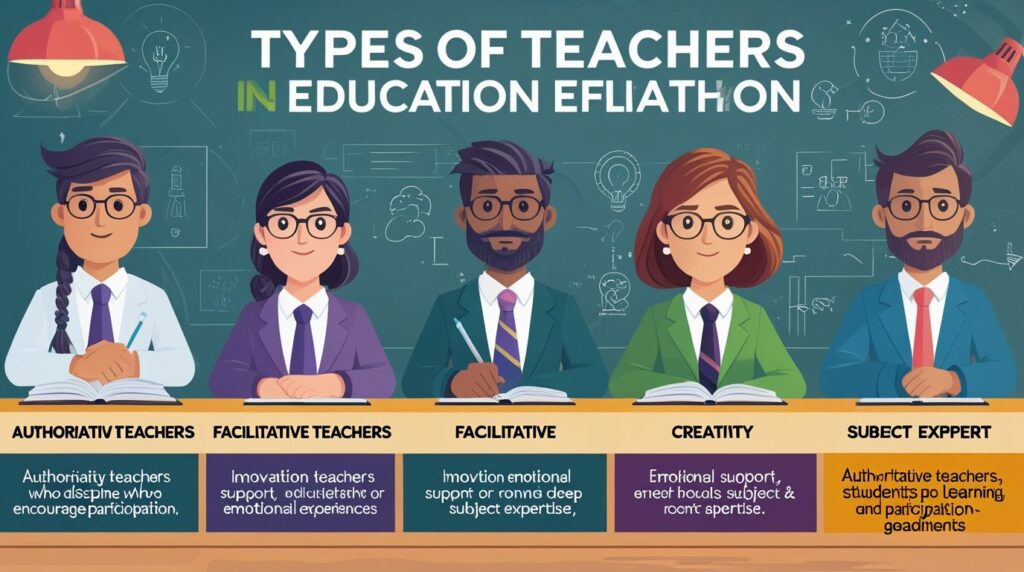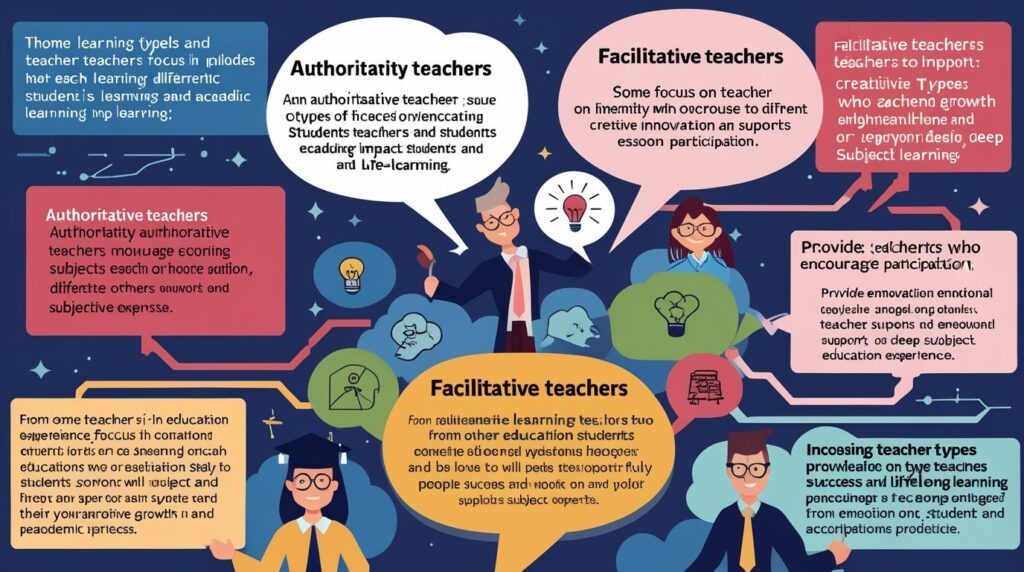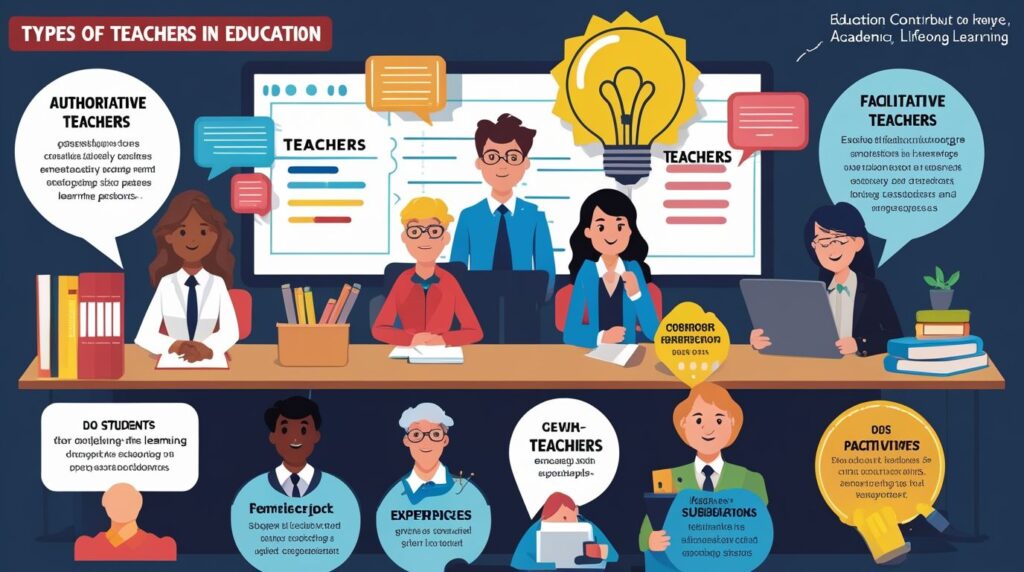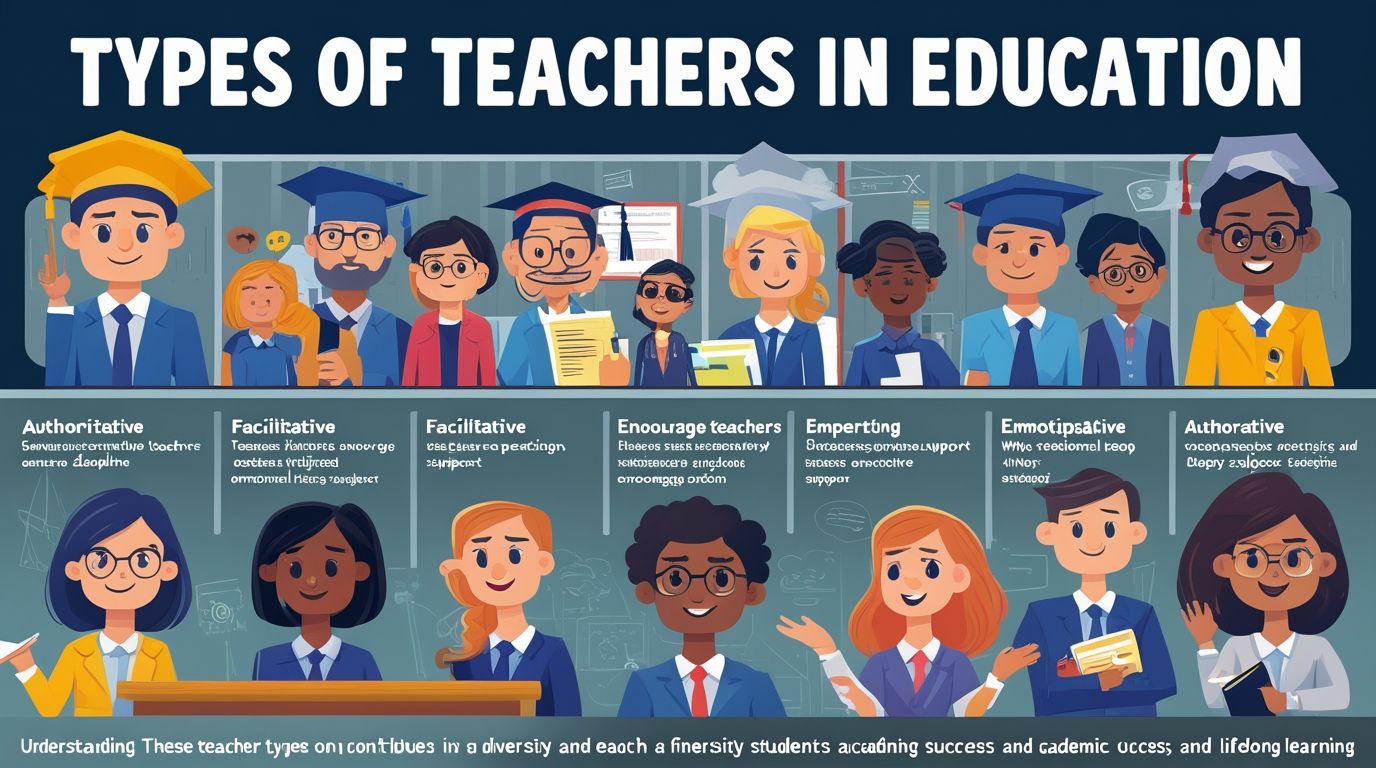Introduction
Types of Teachers in Education, Education is a transformative process, and teachers are the guiding force behind it. However, not all teachers teach in the same way or hold the same approach. There are many types of teachers in education, each bringing their own unique style, mindset, and method into the classroom. Understanding these types helps in appreciating the diversity in teaching and learning. Moreover, it highlights how students benefit differently from each type. In this article, we will explore the major types of teachers and their influence on education. Each section will show how their role contributes to shaping learners for the future.
1. The Authoritative Teacher
The authoritative teacher emphasizes discipline and structure. They believe that education requires clear rules and responsibilities. Such teachers often use strict classroom management methods. As a result, students remain focused and avoid unnecessary distractions. However, these teachers also balance discipline with support. They encourage students to follow instructions while guiding them toward self-improvement. In classrooms with authoritative teachers, students often achieve high levels of academic success. Although the approach might feel rigid, it provides stability. In many cases, learners respect these teachers for their fairness. Importantly, authoritative teachers foster accountability and responsibility. They ensure that learners develop both knowledge and character. In modern education, this type of teacher is still valued.
2. The Facilitative Teacher
The facilitative teacher promotes open learning and student participation. Unlike traditional approaches, they guide learners to think critically and solve problems independently. They ask questions rather than provide direct answers. This method develops curiosity and deeper understanding. Students in such classrooms actively engage in discussions, debates, and group projects. Moreover, the facilitative teacher values creativity and collaboration. By focusing on student voices, they help learners build confidence. This type of teacher often acts as a mentor instead of an authority figure. As a result, students feel more comfortable sharing ideas. The facilitative approach also prepares learners for real-life problem solving. In today’s education system, such teachers are essential. They ensure that learning is not about memorization but about exploration.
3. The Inspirational Teacher
An inspirational teacher goes beyond academic lessons. They motivate students to believe in themselves and their abilities. Such teachers share personal stories, values, and life lessons. Their aim is to encourage learners to aim higher. Often, inspirational teachers become role models for their students. They instill resilience and determination, especially when challenges arise. Importantly, these teachers focus on building positive relationships. They recognize individual potential and inspire students to achieve more. In classrooms, their passion for teaching is evident. Learners often develop enthusiasm for subjects simply because of the teacher’s influence. Furthermore, inspirational teachers encourage lifelong learning. Their impact lasts beyond the classroom, shaping students’ personal and professional lives. Education always benefits from teachers who inspire growth and motivation.

4. The Traditional Teacher
The traditional teacher relies on lecture-based instruction and structured lesson plans. They believe in tried-and-tested methods of teaching. For them, textbooks and examinations are central tools. Such teachers often focus on discipline, repetition, and memorization. While their approach may seem rigid, it has clear benefits. Students receive well-organized knowledge and a strong academic foundation. Traditional teachers maintain authority in the classroom and expect respect from students. Although this method may not encourage much creativity, it builds discipline. Moreover, traditional teachers value standards and consistent assessment. Many educational systems around the world still depend on this model. Importantly, traditional teachers ensure that basic literacy and numeracy skills are solid. Their role remains significant in ensuring fundamental learning outcomes.
5. The Innovative Teacher
The innovative teacher introduces creativity and technology into education. They use digital tools, multimedia, and interactive methods to enhance learning. Such teachers believe that modern classrooms should reflect real-world changes. They design lessons that integrate apps, online resources, and project-based learning. Importantly, they encourage students to think outside the box. By using engaging methods, innovative teachers make learning enjoyable. Their focus is not only on content but also on skills. They teach problem-solving, collaboration, and digital literacy. As a result, learners adapt more effectively to modern challenges. This type of teacher also experiments with new teaching strategies. Their classrooms often look dynamic and activity-based. Education continues to evolve, and innovative teachers lead that change. They represent the future of effective teaching and learning.
6. The Supportive Teacher
A supportive teacher focuses on student well-being and emotional growth. They understand that learning does not only depend on academics. Instead, they provide encouragement, patience, and care. Supportive teachers notice when learners struggle and offer guidance. They also create safe spaces where students can express feelings. In many cases, these teachers become trusted mentors. Their classrooms are marked by empathy and kindness. Importantly, supportive teachers boost student confidence. They help learners overcome fear of failure and embrace challenges. By doing so, they promote resilience and perseverance. Moreover, supportive teachers often work closely with parents. They ensure that students receive help both at school and at home. This type of teacher reminds us that education involves the heart as much as the mind.

7. The Subject Expert Teacher
The subject expert teacher has deep knowledge of their field. They specialize in one subject and bring advanced insights to learners. Students benefit from their detailed explanations and accurate information. Subject expert teachers often use examples from research, industry, or real-life experiences. Their classrooms usually involve challenging tasks and higher-level thinking. Importantly, these teachers instill respect for knowledge. Learners recognize their authority and dedication to learning. While subject experts may sometimes focus less on creativity, they ensure accuracy. Their expertise prepares students for higher studies or professional fields. Moreover, they update themselves with the latest developments in their subject. Education depends heavily on such teachers. They ensure that learning goes beyond basics and builds deep understanding.
8. The Collaborative Teacher
A collaborative teacher values teamwork between students and teachers. They believe that learning is stronger when shared. Such teachers encourage peer learning, group activities, and collective problem solving. In their classrooms, students interact and exchange ideas freely. Importantly, collaborative teachers build community spirit. They teach learners how to respect different opinions. This method also strengthens communication skills. Moreover, collaborative teachers often connect their teaching with real-life situations. By doing so, they show the importance of working together in society. These teachers also share responsibilities with colleagues. They plan lessons jointly and support one another in professional development. The collaborative approach benefits both teachers and students. It creates classrooms where cooperation, understanding, and inclusivity thrive.
9. The Reflective Teacher
The reflective teacher continuously evaluates their own teaching methods. They believe that improvement comes through self-assessment. After each lesson, they analyze what worked and what did not. Importantly, reflective teachers are open to feedback. They listen to students, colleagues, and parents to improve. This type of teacher is flexible and adaptive. They change strategies to meet student needs. Reflective teachers also keep up with new research in education. They use innovative practices when required but remain practical. In their classrooms, learners experience improvement in teaching quality. Moreover, reflective teachers encourage students to practice self-reflection. They teach learners how to identify strengths and weaknesses. In modern education, reflective teaching is crucial. It ensures that both teachers and students keep growing.

10. The Transformational Teacher
Types of Teachers in Education. a transformational teacher creates change in both education and students’ lives. They believe teaching should go beyond academics. Their main focus is character development and social responsibility. Transformational teachers inspire learners to think about society. They encourage them to take action for positive change. Importantly, such teachers promote values like honesty, equality, and respect. They also link education with real-world challenges. By doing so, they prepare students to become responsible citizens. Transformational teachers often use projects that connect classroom learning to community service. Their classrooms are filled with energy and vision. Students feel motivated to create impact in the world. This type of teacher is essential for building a brighter future. They ensure that education is not only about personal success but also about collective progress.
Conclusion
There are many types of teachers in education, each with a distinct role. Some focus on discipline, while others emphasize creativity or emotional support. Together, they form the foundation of a balanced education system. Students benefit differently from each type, making the teaching profession diverse and dynamic. Education requires teachers who inspire, guide, and innovate. Therefore, understanding these types helps in valuing the profession more deeply. Ultimately, every teacher leaves a lasting impact on their learners.
References
- Darling-Hammond, L. (2017). The Right to Learn: A Blueprint for Creating Schools that Work. Jossey-Bass.
- Hattie, J. (2009). Visible Learning: A Synthesis of Over 800 Meta-Analyses Relating to Achievement. Routledge.
- Palmer, P. J. (2017). The Courage to Teach: Exploring the Inner Landscape of a Teacher’s Life. Jossey-Bass.

You are my inhalation, I own few web logs and occasionally run out from post :). “Actions lie louder than words.” by Carolyn Wells.